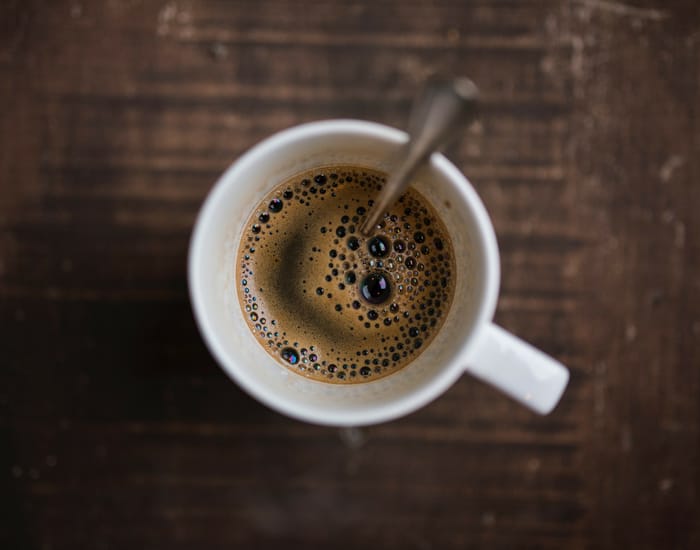By Will Hawkins
Is coffee actually good for you? The nation's favourites ranked.
We Brits drink around 55 million cups of the stuff a day.* Yes, a day! That's a lot of coffee! But what does that mean for our health?
Well, as it's International Coffee Day this Sunday, we're going to set the record straight once and for all.
Plus, we'll look at some of the UK's favourite takeaway coffees and rank out of 10 just how good for you they are.
First things first, is coffee healthy?
This has been a controversial subject for years. Depending on who you ask, you'll hear everything from it being the elixir of life, to it being the the worst thing on Earth you could put in your body.
Well, we have some good news. Drinking coffee can be good for you!
Now, we're talking about drinking a healthy amount here, not gallons of it everyday. As they say, too much of anything can bad for you. Read on to find out more about its health benefits.
It's good for your brain
Many of you will brew up when you feel you need a boost of caffeine. Caffeine is a stimulant that perks you up by blocking the function of an inhibitory neurotransmitter, which is a hormone in the brain, called adenosine.
By blocking adenosine, caffeine increases brain activity, which means you release other neurotransmitters, like norepinephrine and dopamine. These help reduce tiredness and makes us feel more alert. Clever stuff, eh?
It's packed full of nutrients
It doesn't just wake you up though. It's also packed full of Vitamin B2, B5, B1 and B3, folate, magnesium, potassium and phosphorous. Your body needs all of these to help it stay healthy
And it doesn't stop there. You actually get more antioxidants from drinking coffee than from eating fruit and vegetables combined (based on a typical western diet). Antioxidants can help your body ward off diseases, so they're a good thing to consume.
So there you have it - drinking coffee (sensibly!) can be good for your health.
Which takeaway coffee is the healthiest choice?
Before you rush out to grab a cup, we've looked at the UK's favourite takeaway coffee to see just how good they are for you.
We've based their scores on their calorie, caffeine, protein, sugar and fat content.
Starbucks Pumpkin Spiced Latte
Calories: 380
Caffeine: 150mg
Protein: 14g
Sugar: 50g
Fat: 15g
Rating: 4/10
This coffee usually makes an appearance around Halloween and it's a good source of protein and calcium due to its high milk content. Its caffeine content is about average for a coffee too.
However, we'd recommend you only have this as an occasional treat, rather than a morning staple, because of its high sugar and calorie content.
Starbucks Caramel Frappuccino
Calories: 420
Caffeine: 100mg
Protein: 4g
Sugar: 62g
Fat: 17g
Rating: 1/10
As far as nutrition goes in coffee, this one doesn't offer much, so keep it to a minimum. It has a very high calorie content, as well as being high in sugar and fat. Plus, it's low in caffeine and has poor protein content.
Café Nero Cappuccino
Calories: 65
Caffeine: 160mg
Protein: 4.6g
Sugar: 6.9g
Fat: 2.2g
Rating: 8/10
Nutritionally speaking, this coffee is a good health conscious choice. Almost 5 times less calories than the caramel frappucino, and significantly less in sugar and fat, this is one of the best for those who are being careful about their calorie intake.
Pret White Latte
Calories: 118kcal
Caffeine: 140mg
Protein: 8.5g
Sugar: 11g
Fat: 4.3g
Rating: 7/10
Don't be too concerned about its slightly higher calorie content, as this coffee provides a good source of protein, at a fraction of the calorie cost and its caffeine content is adequate too.
The slightly higher sugar and fat content is due to the increased milk content of a latte. Overall though, this is a good choice if you're a regular coffee drinker.
Costa Espresso
Calories: 7kcal
Caffeine: 140mg
Protein: 0.5g
Sugar: 0.9g
Fat: 0.2g
Rating: 9/10
This espresso is incredibly low in calories, sugar and fat content, so it seems like a steal for a caffeine hit. However, it doesn't quite make a 10/10 because it lacks in other macros and fat-soluble vitamins that you could get from a cappuccino, due to its milk content.
But, we think that if you're after a caffeine boost, it's one of the healthiest ways to drink your coffee and is the preferable option in Italy – the expert coffee drinkers! If you're looking for a boost in macros and vitamins, opt for a cappuccino instead.
Most popular
Related articles

Is coffee good for you?

11 health benefits of coffee